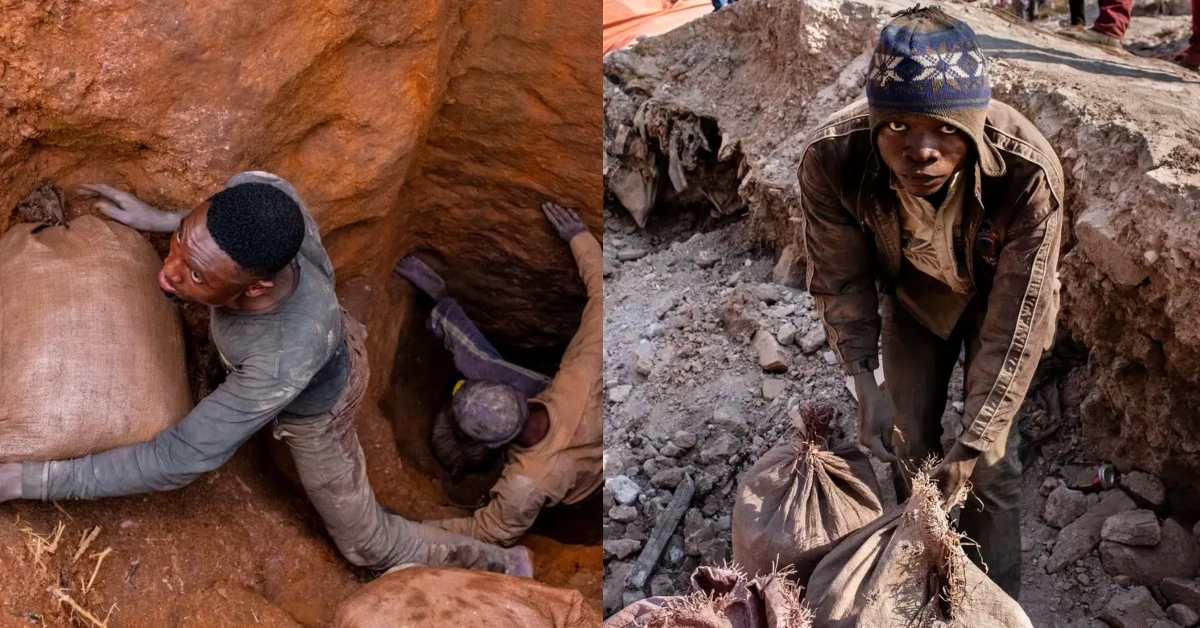Have you ever stopped to think about the true cost of the batteries that power your beloved gadgets and electric cars? The reality is that the cobalt used to manufacture these technologies often comes at a terrible cost to the people of the Democratic Republic of Congo (DRC).
In recent years, the demand for cobalt has skyrocketed with the increased electrification of our world. Unfortunately, this has led to a dark and dangerous situation in the cobalt mining industry in the DRC.
It all began with the discovery of cobalt by a man digging a pit latrine in Kolwezi. Since then, a population of miners has flocked to the southern region in search of work, leading to a sharp increase in demand for cobalt.
Read Also: Gold Mafia: Behind the Shadows of Africa’s illegal Gold Business
However, the mining industry in the D.R.C is notoriously lacking in supervision and safety regulations, leaving workers vulnerable to exploitation and hazardous working conditions.
Shockingly, children as young as four years old are working in these mines due to extreme poverty. The idea of children risking their lives in mining sites is both disturbing and heart-wrenching. These children are exposed to hazardous chemicals and toxins that can lead to serious long-term health issues.
Mark Canavera, a child welfare expert at Columbia University, who has spent time in Kolwezi, laments the lack of government capacity to monitor children’s involvement in the cobalt mining industry. Despite the dangers, parents often require their children to help with income due to their dire circumstances.
Read Also: Kenya ranked the best country in Africa for expatriates
The job is physically demanding, with long hours and lack of breaks leading to negative health outcomes for workers. The mining process itself is also environmentally hazardous.
Heavy chemicals used in the mining process pollute the air, water and soil, causing irreversible damage to the environment. Workers are frequently exposed to toxic chemicals that can cause long-term health issues, and some have even been buried alive in the soil.
It’s a tragedy that the workers who risk their lives to extract this valuable mineral are paid very little, leading to a cycle of poverty. Fair pay is complicated due to the need for workers to agree on a specific amount with mining companies, government officials, stakeholders, and consumers.
Efforts are being made to address this issue, but more needs to be done.
As consumers, we have a responsibility to be aware of the human cost of the products we use. The lack of regulation or oversight in the cobalt business means that these exploitative practices can continue.
It’s up to us to demand more ethical and responsible practices from the companies involved in the cobalt supply chain. Let’s make sure that the batteries we rely on aren’t powered by the exploitation and suffering of others.
Despite all that, miners are violated and exploited by being paid very little that cannot sustain their lives which may end up leading to a cycle of poverty. The issue of fair pay is complicated because the workers have to agree on a specific amount with the mining companies, the government, stakeholders and even consumers. Efforts are being made to address the issue.
Because there is no regulation or oversight in the cobalt business, these exploitative practices can continue. As demand for cobalt grows, there is a greater need than ever for more ethical and dependable business practices. We must be aware of the human cost of the products we use as consumers and require more transparent and responsible practices from companies engaged in the cobalt supply chain.
















